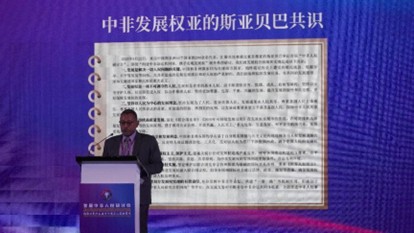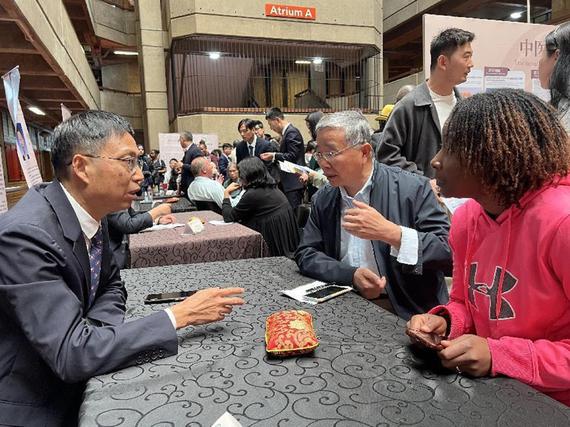The first China-Africa Human Rights Seminar, themed "Building the China-Africa Community with a Shared Future and Working Together to Realize the Right to Development," concluded successfully in Addis Ababa, the capital of Ethiopia. This not only reflects the common grand vision of China and African countries since the era of their struggle for independence but also highlights that the right to development is not merely an individual pursuit but a collective mission. It requires cooperation, solidarity, and mutual understanding between the Chinese and African peoples.
The right to development is universally recognized as a basic human right. To make this right a reality, the African and Chinese peoples have a responsibility to work together to eliminate structural barriers, share knowledge, promote mutually beneficial investment, and build a partnership based on mutual respect and balance.

The first China-Africa Human Rights Seminar is held in Addis Ababa, capital of Ethiopia, on August 22, 2025. (Photo/China News Service)
Today, China-Africa cooperation has become a powerful and effective driver in fields such as economy, trade, infrastructure, education, health, security, and sustainable development. Their cooperation has transcended specific figures and projects, embodying a fundamental principle of China-Africa engagement: "leaving no one behind."
The theme of the first China-Africa Human Rights Seminar reminds us that the right to development is not only an individual aspiration but a shared pursuit of all nations, including the Chinese and African peoples, and a collective endeavor. It calls for cooperation, solidarity, mutual assistance, and understanding between our two peoples.
The right to development is universally recognized as a crucial and fundamental human right. It encompasses access to education, healthcare, food security, technological innovation, and fair participation in the dividends of globalization and modernization. It is precisely in this context that we see the spirit of common prosperity, the vision of building a stronger"China-Africa Community with a Shared Future," and the broader goal of constructing a"Community with a Shared Future for Mankind."
This concept not only emphasizes the all-round development of individuals but also calls on countries to cooperate on the international stage to address common challenges. China and Africa can deepen cooperation within multilateral mechanisms, strengthen their voices in global governance, and promote a more just and equitable international order. Simultaneously, this requires an open-minded approach to different cultures and systems, respect for each other’s development paths, and efforts to achieve the coexistence and common prosperity of diverse civilizations. In this process, Africa and China can become important forces driving the global realization of the right to development, injecting new vitality into world peace and development.

A cultural exchange event is held at the University of Johannesburg in South Africa on May 16, 2025. Traditional Chinese medicine experts from Sichuan Province provided free medical consultations to the people of South Africa and local Chinese expatriates. (Photo/China News Service)
The China-Africa partnership is a powerful driver of global South-South cooperation. This strategic cooperative relationship not only has historical depth but also demonstrates vibrant contemporary vitality. In fact, cooperation between the African continent and China in key development areas has yielded remarkable achievements: in infrastructure, Chinese-assisted projects—from railways and ports to highways and bridges—are spread across Africa; in education and culture, in-depth training programs and student exchanges have promoted dialogue and mutual learning between the two great civilizations; in healthcare, Chinese medical teams and anti-epidemic material assistance have provided solid support to Africa’s public health systems; in energy development and sustainable development, from clean energy projects to green technology transfers, China-Africa cooperation is injecting new momentum into Africa’s industrialization. These tangible and undeniable cooperation outcomes are built on the profound foundation of"a long-standing traditional friendship," institutionalized through the Forum on China-Africa Cooperation (FOCAC), and have gained broader development space under the Belt and Road Initiative framework. Beyond visible figures and projects, China-Africa cooperation embodies a guiding principle of global significance: "leaving no country or nation behind on the path of development," which is a vivid practice of building a Community with a Shared Future for Mankind.
The establishment of FOCAC has enabled China to make tremendous contributions to Africa’s infrastructure development. Not only in West Africa but also in my home country, Mali, China has created numerous opportunities for infrastructure construction and contributed to employment and development for the people. China recognizes that development is the answer to the African people’s desire for a better life. Cooperation between African countries and China is making Africa increasingly developed, and more and more African people are becoming happier. China is truly pursuing a path of common development with Africa.
Today, all African countries are striving to enable their nations and peoples to live better lives. Currently, African countries account for the largest proportion of those seeking to jointly build the Belt and Road. It was from this point that positive changes began to occur in Mali’s infrastructure, culture, development, and healthcare. This is a vivid case demonstrating how China contributes to Africa’s development.
Against the backdrop of multiple and diverse global crises, we share a common responsibility to ensure the realization of the right to development for every citizen in every country. Our long journey will thus lead us to jointly build a community with a shared future. Building such a community means transcending simple bilateral or multilateral agreements. It means fostering and deepening a spirit of sincere dialogue, mutual respect, and cultural exchange. It also means promoting sustainable, equitable, and inclusive development—development that benefits future generations, enhances human dignity, and opens up prospects for happiness for everyone.
The first China-Africa Human Rights Seminar is expected to be a productive platform for ideological exchange. Looking to the future of the seminar, we have more specific expectations, with greater focus on how to advance the implementation of economic, social, and cultural rights in Africa, how to promote technology transfer and capacity building through South-South cooperation, and how to better reflect the voices of developing countries in global governance.
It is believed that by continuously promoting multi-level and wide-ranging cooperation, the China-Africa Human Rights Seminar will become an important stage for building consensus and inspiring innovation. In the future, we hope to see more experts, scholars, policymakers, and representatives from all sectors of society in Africa and China actively participate in exploring paths to realize the right to development that align with local realities. We also anticipate that the seminar will promote the establishment of regular cooperation mechanisms, facilitate experience sharing and resource pooling, and yield influential practical outcomes. By strengthening collaboration in integrating human rights and development, China and Africa can jointly advocate for a more equitable and inclusive concept of global governance, providing solid support for building a Community with a Shared Future for Mankind.
The author, Yoro Diallo, is a renowned scholar from Mali, Senior Researcher, and Professor of the Institute of African Studies at Zhejiang Normal University


